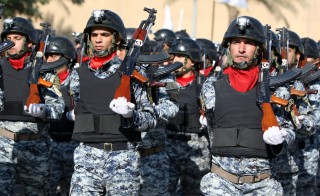(单词翻译:单击)
HARI SREENIVASAN: The Reuters news agency reports that the 17- month U.S. effort to train and build up the Iraqi army has fallen short. Current and former U.S. officers and officials told Reuters that despite U.S. efforts, the army's combat capacity has barely improved, and that the government relies too heavily on Shiite militias to do the fighting.
For more about the readiness of the Iraqi army, I am joined via Skype by Ned Parker of Reuters, who co-wrote the report.
For someone watching at home, give us a little bit of the lay of the land here. What's the mix between the Iraqi army and the militias? Who is doing most of the fighting?
NED PARKER, REUTERS: Well, it's a mixed bag, really. The problem is is that the Iraqi army only has about five functioning divisions, according to U.S. officers. And those divisions are about 60 to 65 percent capacity. So on the ground now, when fighting happens, the Iraqi military has basically a shortage of labor. And the one good fighting force that's there, that's effective from the state, is the Iraqi Special Forces. And according to U.S. officers, those forces are in real danger of burning out because they are the only force the state has been able to rely upon time and time again over the last two years.
So the other force fighting alongside the special forces are militia groups that many of them are funded by Iran. They have hard-line sectarian ideology, and have been deeply controversial. So on the ground, what happens is many places like north of Baghdad, in areas like Tikrit or Beiji that were retaken from the Islamic State, by the Iraqi special forces, as soon as the battle is over in effect, the militias take over. And people in these areas, whether local officials, ordinary citizens, see not the state but the militia forces as the ultimate power.

HARI SREENIVASAN: In part of your story, you also talk about the supply chain and that it's not all getting to the Iraqi army. Sometimes that the weapons that the United States is sending is actually getting to these militias.
NED PARKER: What has happened is that as supplies go down the chain to big depots, such as Taji, which is the largest weapons warehouse for the Iraqi military in Iraq, on bases like that, if militias have influence, whether through corruption or just intimidation, they can take what they want. Now, U.S. officers I've spoken to say that there was a huge effort last summer to tamp down on this and to stop it, and there are very few cases. But it still continues.
HARI SREENIVASAN: And so what's the U.S. supposed to do in this?
NED PARKER: Some officers say that the Americans are not thinking about this enough and aren't doing enough politically to push the deal. And when you speak with U.S. military spokesmen, they'll say our job is not to police Iraq. And the military track movers far faster than the diplomatic track.
But then if the military track is shaping a reality on the ground that is only further antagonizing and pushing Sunnis toward perhaps a new radical force that could emerge after the Islamic State, then it's — that's a problem. Because the political solution is so far behind, the new realities are creating new problems.
HARI SREENIVASAN: Ned Parker of Reuters joining us. Thanks so much.
NED PARKER: Thank you.


